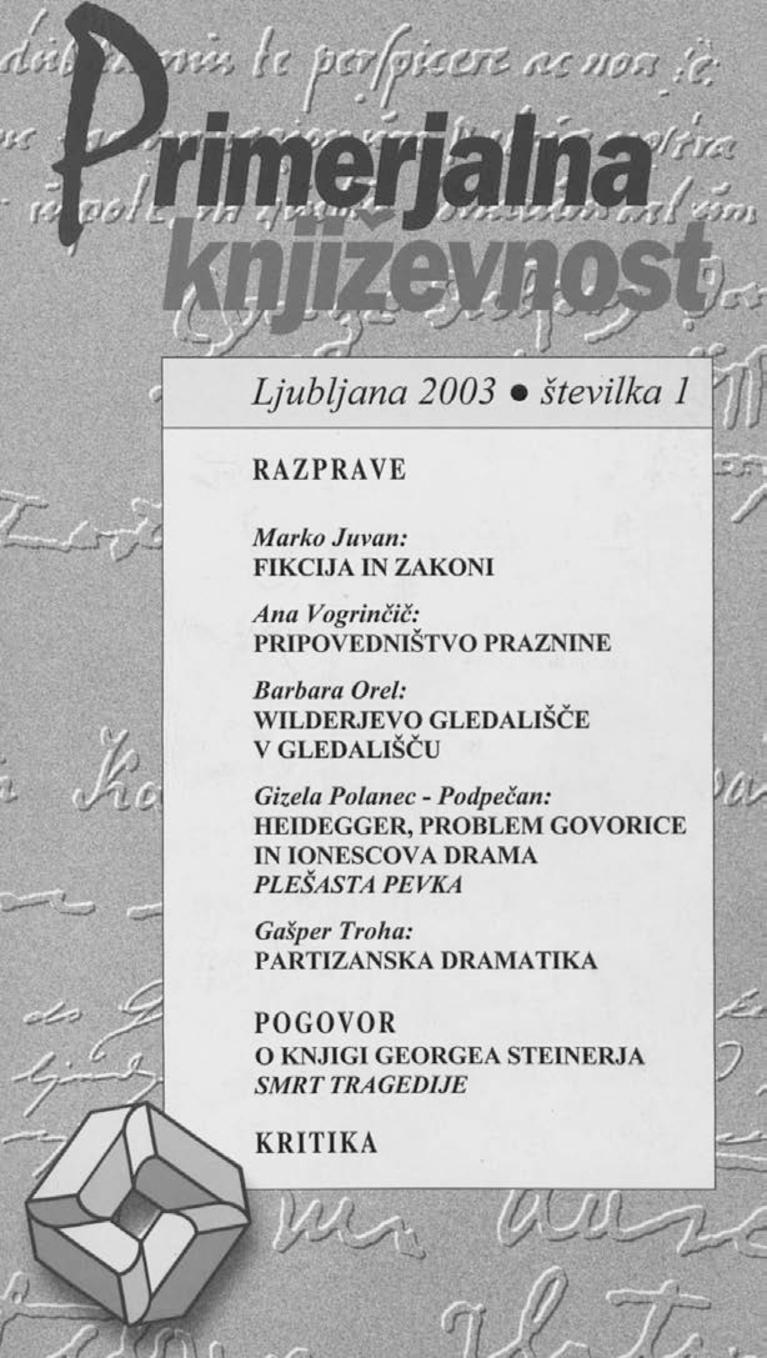Partisan Drama (1941–1945)
Keywords:
Slovene drama, partisan drama, political theatre, agitkaAbstract
During the Second World War there was lively theatrical activity in the partisan army. What remains of it, apart from the memoirs of the participants, are numerous theatrical texts that have been studied by Viktor Smolej and Ferdo Fischer. However, former analyses seem unable to investigate them without bias and therefore either take their aesthetic value for granted, simply because they are a reflection of the nation’s struggle for freedom, or deny them any aesthetic value for ideological reasons. – This can be seen even through the historical development of the terminology of the genre. Partisan dramatic texts used to be called “sketches”, as this stresses their brevity and unpretentiousness. As this term is unsuitable for longer and more complex texts, that are rare, but nevertheless exist, Matjaž Kmecl in his Mala literarna teorija (1976), uses the term agitka, which is taken from the Russian revolutionary and social-realistic theory of drama. This term seems much more suitable, as it does not specify the length of the pieces, but conveys the main quality of these texts, being agitation and propaganda for the partisan movement and communist revolution. It has finally been adopted by Andrej Inkret in Enciklopedija Slovenije (1987). – This article tries to approach agitka in an unprejudiced manner to find its immanent structure. It was most interesting to discover that it resembles the historical genre of commedia dell’arte, especially in having fixed characters and situations. This structure consists of seven characters that position themselves between two extremes, the positive end being the hero, and the negative, the domestic traitor. – When seeking out reasons for this, it is usually believed that it was the result of very strict censorship in the partisan army, and that agitka is therefore too ideological to be recognized as an example of artistic literature. However, what strikes us as odd is that there are some complex pieces (Žene ob grobu, Težka ura…) that resemble the structure of bourgeois drama. This is why it is probably more accurate to think of agitka as a result of especially harsh historical and political circumstances that required a genre which could be easily written, staged and, finally, also controlled by the leadership; but at this point we have to add that this censorship was not nearly as strict as it was usually believed to have been, which is demonstrated by the variety of the pieces. Therefore, we have to admit that agitka is more or less the reflection of the genuine beliefs of its authors.References
A
Rokopisni oddelek NUK:
APIH, Milan: Rdeča armada prihaja, 1944, Partizanski oder 6.
KOŠAK, Milan: Birokrat, 1945, Partizanski oder 5.
KOZINA, Marjan: Štirje bratje, 1945, Partizanski oder 6.
LJEVIŠIN, V., Mašistov, A.: Paška, 1945.
Srečanje, Slika iz dnevov srečanja med Rdečo Armado in NOV Slovenije, 1945, Partizanski oder 7.
ZUPAN, Vito: Punt, 1944, Partizanski oder 2.
ZUPAN, Vito: Tri zaostale ure, 1944, Partizanski oder 1.
ZUPAN, Vitomil: Aki, 1944, Partizanski oder 5.
Arhiv republike Slovenije:
BOR, Matej: Ječa se je odprla, 1944.
BRAVNIČAR, Dušan – Veljko: »Mati«, Gospod Lisjak, Pokrajinski odbor za Primorsko Slovenijo, 1944.
GUSTL: »Hitler in Mussolini«, Gospod Lisjak, Pokrajinski odbor za primorsko Slovenijo, 1944.
IVANOV, Radoš (Šumrada, Vinko): Slovenska mati, 1944, Nova pisarija 1.
ŠILC, Majda: Obisk, Agitprop Skoja X. udarne brigade Ljubljanske.
VOŠNJAK, Sergej: Borba, 1944.
Arhiv AGRFT:
ZUPAN, Vito: Jelenov žleb, 1944.
Knjižne in revijalne objave po vojni:
BON, Jože: »Zločin na novomeškem trgu«, Težka ura, Mladinska knjiga, Ljubljana, 1967, Knjižnica Kondor 94.
BOR, Matej: »Gospod Lisjak«, Težka ura, Mladinska knjiga, Ljubljana, 1967, Knjižnica Kondor 94.
BOR, Matej: »Težka ura«, Raztrganci, Slovenski knjižni zavod, Ljubljana, 1946.
BOR, Matej: Raztrganci, Slovenski knjižni zavod, Ljubljana, 1946.
JARC, Miran (Janez Suhi): »Gabrenja«, Obzornik, 1951, 144–148.
KLOPČIČ, Mile: »Mati«, Težka ura, Mladinska knjiga, Ljubljana, 1967, Knjižnica Kondor 94.
KOCBEK, Edvard: »Večer pod Hmeljnikom«, Edvard Kocbek, Zbrano delo 1/2, DZS, Ljubljana, 2000.
REHAR, Radivoj: »Hrustač«, Težka ura, Mladinska knjiga, Ljubljana, 1967, Knjižnica Kondor 94.
SINTIČ, Zvone: »Naš pohod«, Težka ura, Mladinska knjiga, Ljubljana, 1967, Knjižnica Kondor 94.
VODUŠEK, Božo: »Žene ob grobu. Igra v 5 prizorih«, Slovenski zbornik, 1945, 304–316.
VREG, France – Mile: »Morale je zmanjkalo«, Težka ura, Mladinska knjiga, Ljubljana, 1967, Knjižnica Kondor 94.
ZUPAN, Vitomil: Rojstvo v nevihti. Dramatska reportaža v treh dejanjih, Založba slovenskega knjižnega zavoda OF, Ljubljana, 1945, Novi ljudski oder 3.
B
BERNIK, France in DOLGAN, Marjan: Slovenska vojna proza, 1941–1980, Slovenska matica, Ljubljana, 1988.
Enciklopedija Slovenije 1, Mladinska knjiga, Ljubljana, 1987.
FISCHER, Ferdo: »Spremna beseda«, Težka ura, Mladinska knjiga, Ljubljana, 1967, Knjižnica Kondor 94.
FISCHER, Ferdo: Partizanska dramatika, RSS, Ljubljana, 1966.
KALAN, Filip: »Znana in neznana NOB«, Kultura, revolucija in današnji čas, Ljubljana, 1979.
KALAN, Filip: Veseli veter, Cankarjeva založba, Ljubljana, 1975.
KERMAUNER, Taras: Dramatika narodnoosvobodilnega boja. 1, Naša sveta stvar (leva), Slovenski gledališki muzej, Ljubljana, 1998.
KMECL, Matjaž: Mala literarna teorija, Borec, Ljubljana, 1976.
KOCBEK, Edvard. Listina, Slovenska matica, Ljubljana, 1982.
KRALJ, Lado: Teorija drame, DZS, Ljubljana, 1988, Literarni leksikon 44.
Literatura. Cankarjeva založba, Ljubljana, 1977, Leksikoni Cankarjeve založbe.
MORAVEC, Dušan: »Gledališče v narodnoosvobodilnem boju«, Kultura, revolucija in današnji čas, Ljubljana, 1979.
MORAVEC, Dušan: »Zgovorne partizanske muze«, Josip Vidmar, Državna založba Slovenije, Ljubljana, 1975.
PONIŽ, Denis: Komedija in mešane dramske zvrsti, Znanstveno in publicistično središče, Ljubljana, 1995.
Rečnik književnih termina, Nolit, Beograd, 1985.
SMOLEJ, Viktor: Slovstvo v letih vojne 1941–1945, Slovenska matica, Ljubljana, 1971, Zgodovina slovenskega slovstva 7.


